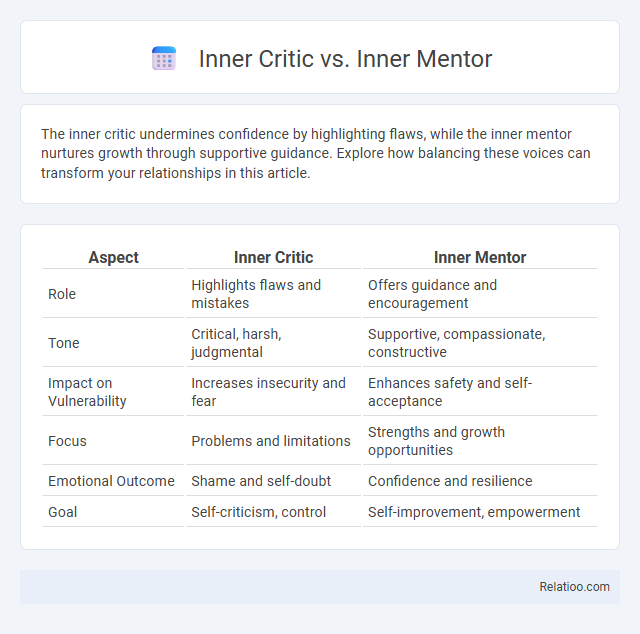The inner critic undermines confidence by highlighting flaws, while the inner mentor nurtures growth through supportive guidance. Explore how balancing these voices can transform your relationships in this article.
Table of Comparison
| Aspect | Inner Critic | Inner Mentor |
|---|---|---|
| Role | Highlights flaws and mistakes | Offers guidance and encouragement |
| Tone | Critical, harsh, judgmental | Supportive, compassionate, constructive |
| Impact on Vulnerability | Increases insecurity and fear | Enhances safety and self-acceptance |
| Focus | Problems and limitations | Strengths and growth opportunities |
| Emotional Outcome | Shame and self-doubt | Confidence and resilience |
| Goal | Self-criticism, control | Self-improvement, empowerment |
Understanding the Inner Critic
The inner critic represents the negative self-talk that undermines confidence and fuels self-doubt, often rooted in past experiences and fear of failure. Understanding the inner critic involves recognizing its patterns and triggers to reduce its disruptive impact on mental health and decision-making. Cultivating the inner mentor, a compassionate and wise internal voice, helps counterbalance the inner critic by promoting self-encouragement and growth.
Traits and Triggers of the Inner Critic
The Inner Critic often exhibits traits such as harsh judgment, perfectionism, and self-doubt, triggered by situations involving failure, rejection, or unmet expectations. In contrast, the Inner Mentor fosters self-compassion, encouragement, and constructive guidance, offering a balanced perspective during moments of stress or uncertainty. Understanding the specific triggers of the Inner Critic, like negative feedback or comparison to others, helps in shifting towards the supportive voice of the Inner Mentor.
Defining the Inner Mentor
The Inner Mentor represents the supportive, wise voice within that offers guidance and constructive feedback, contrasting sharply with the Inner Critic's harsh, judgmental tone. While the Inner Critic highlights mistakes and fuels self-doubt, the Inner Mentor helps you build confidence by encouraging growth and self-compassion. Developing your Inner Mentor allows you to transform negative self-talk into empowering insights for personal and professional development.
Qualities of the Inner Mentor
The Inner Mentor embodies qualities of wisdom, compassion, and encouragement, providing constructive guidance rooted in self-awareness and growth. Unlike the Inner Critic, which often focuses on flaws and mistakes, the Inner Mentor promotes positive reinforcement and fosters resilience by highlighting strengths and potential. This nurturing voice helps navigate challenges with patience and understanding, enabling personal development and emotional balance.
Inner Critic vs Inner Mentor: Key Differences
The inner critic and inner mentor represent opposing internal voices, with the inner critic delivering negative, judgmental self-talk that undermines confidence and fosters doubt, while the inner mentor provides supportive, constructive guidance that encourages growth and resilience. Key differences lie in their functions: the inner critic often highlights perceived failures and limitations, impeding progress, whereas the inner mentor emphasizes strengths, learning opportunities, and positive reinforcement. Developing awareness of these distinct roles enables individuals to shift from self-sabotage to self-empowerment by embracing the inner mentor's nurturing perspective over the inner critic's harsh scrutiny.
The Impact of the Inner Critic on Growth
The inner critic can significantly hinder personal growth by fostering self-doubt and negative self-talk that diminish confidence and motivation. In contrast, the inner mentor promotes constructive guidance and encouragement, helping individuals to reframe challenges as opportunities for learning and development. Balancing these inner voices allows for a healthier mindset that supports resilience and continuous growth.
How the Inner Mentor Empowers You
The Inner Mentor empowers you by providing compassionate guidance and constructive feedback, fostering self-awareness and resilience. Unlike the Inner Critic, which often triggers self-doubt and negative self-talk, the Inner Mentor encourages growth and confidence through supportive inner dialogue. This positive inner voice cultivates motivation, helping you navigate challenges and achieve personal development goals effectively.
Strategies to Quiet the Inner Critic
Strategies to quiet the inner critic involve mindfulness techniques, cognitive restructuring, and self-compassion exercises that help reframe negative self-talk into supportive guidance. Engaging the inner mentor by cultivating positive affirmations and visualizing a wise, encouraging presence can strengthen resilience against self-criticism. Consistent practice of grounding methods, journaling, and therapy-based interventions such as Cognitive Behavioral Therapy (CBT) enables a shift from harsh inner critic dominance to empowering inner mentor influence.
Cultivating Your Inner Mentor Voice
Cultivating your inner mentor voice involves consciously shifting from the harsh judgments of your inner critic to a compassionate, guiding presence that encourages growth and learning. This inner mentor offers constructive feedback, fostering self-awareness and resilience by highlighting strengths and potential solutions rather than focusing solely on mistakes. Developing this supportive inner dialogue helps you build confidence and make empowered decisions in both personal and professional challenges.
Embracing Self-Compassion for Lasting Change
Inner critic's harsh judgments often hinder personal growth, while inner mentor encourages self-compassion and positive reinforcement to foster resilience. Embracing self-compassion allows you to transform negative self-talk into nurturing guidance, promoting lasting change. Cultivating this balance enhances emotional well-being and supports sustainable personal development.

Infographic: Inner critic vs Inner mentor
 relatioo.com
relatioo.com